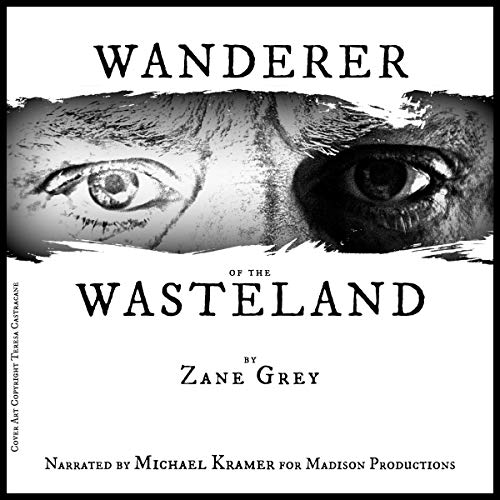We’re heading out to the old west today, Obscurists. Today’s book is Zane Grey’s “Wanderer of the Wasteland,” which was suggested to me by Kate Reading—no joke—that Kate Reading for those of you who are audiobook fans. Kate Reading, who has actually done tons of real stuff and narrated a mountain of awesome books!
She also took the time to suggest to some obscure blogger—who primarily talks to himself on the internet—a book, this book, read by her husband Michael Kramer, another fantastic narrator. Sure, this interaction happened because I miss-attributed another book read by Michael Kramer on Twitter to @Kramer_Reading their joint account, which is primarily managed by Kate. Still, lesson learned, and by apologizing, I got to read this book, so it was a great mistake to make.
***The Non-Spoiler part of this review***
What I love about this book:
Something about the desert is fascinating—I’ve never actually been to one, but I’ve read many stories and nonfiction books that feature them. It’s one of those archetypical foreboding landscapes. The land where no one belongs. Right off the bat, I was drawn in by this novel’s setting, even though I can’t begin to count how many westerns in one form or another I’ve consumed over the years. So far, I’ve never grown sick of them.
Ultimately, “Wander of the Wasteland” is a survival story—but not just in the sense of the body. It’s also a survival story of how the main character retains his humanity, even in the starkest wilderness imaginable, despite it, or maybe because of it.
This next point is a minor spoiler, but it’s also really inciting action that gets the story rolling and is in most summaries of the novel. So I feel it’s fair game. Ok? Ok.
“Wander of the Wasteland” takes a famous biblical story plotline—that of Cain and Abel—and turns it on its ear. It imagines a story of, what if Abel killed Cain instead of the other way around? It makes for an exciting thought experiment, and I thoroughly enjoyed the concept.
What I don’t love about this book:
This is a novel published originally in 1923 about the old west, and Grey certainly had—let’s say—thoughts about women. Some good, some romantic, others were weird, but mostly his views about women were just ignorant. When he wrote the novel, I don’t think back then he would have been considered controversial for his views or even was considered to have poor taste. Still, the world moves on, and it certainly moved on from the cultural reference frame he lived in while creating his classic stories.
As you might guess, since Grey’s novel has some antiquated views on women, it also features some out-of-date opinions on anyone who isn’t white. The noble savage routine is used a few times in this book, which probably seemed progressive when it was published. You can almost hear someone say in old-timey racist talk, “see here now, fellas, some of these Mexicans and Natives are like people—they’re the good ones.” That flavor of racism.
So I’m odd because I like biblical allusions in stories or events in a novel seemingly informed by scripture, but as for actual bible talk—pretty bored. It’s not even talking specifically about the bible that loses me. I can do that just fine. It’s the constant reading of God’s intentions in everything, no matter how mundane. As if that person knows. I’m not sure when this belief that God is like our own personal invisible friend became popular, but I’ve never got it. What I’m getting at is there are some preachy moments in this book, and outside of character building—it was fine—I guess.
This preview is an Amazon Affiliate link;
as an Amazon Associate, I earn from qualifying purchases
***The Spoiler part of this review***
***Ye be warned to turn back now***
The quick and dirty synopsis:
The novel starts with Adam Larey taking off, swearing that he’ll have nothing further to do with his brother Guerd. Adam is going to go make his own way out west.




